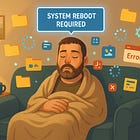Why Your Future Self Hates You, and How to Make Peace
How to Waste Two Weeks and Still Learn Something
Do you remember when you were a kid the feeling when you walked out of school on the last day to start your holidays? I can vividly remember walking out on the last day of secondary school. It was amazing, such a feeling of freedom having finished our exams. I went with a group of my friends and we ceremoniously burnt our exercise books. Life was full of possibility, there was so much to do without the burden of school.
I felt a similar feeling recently, although to a much lesser degree, when I walked out of work knowing I didn't have to walk back in for two whole weeks.
It was the Easter holidays, meaning: no enforced early mornings dictated by the school run, no uniform to sort or breakfast to rush, just pure, delicious freedom and possibility.
The opposite of that feeling of freedom is when you come out the other end and realise those two weeks evaporated like a puddle on a sunny day. I had so many plans from DIY projects, days out with the kids, writing, reading and engaging more on Substack. I did some of it, just not very much of my original to do list. I didn't sit around doing nothing. I just got sidetracked a lot.
When you give a squirrel two whole weeks and no set structure, it will hide half finished projects to pick up later, then forget where it buried them. And with that comes regret.
I couldn't even tell you what I spent most of my time doing. It's a blur of well intended distraction.
The Abundance Paradox
I've written before about The Abundance Paradox, the idea that the more we have of something, the less we value it. Time might be the ultimate example. We all know our time is finite, yet give us a handful of free hours and we treat them like the loose change that falls out between the sofa cushions: disposable.
When my schedule is jam packed and I have exactly 27 available minutes to write, I manage to make those minutes count. When I have two long weeks? Suddenly everything feels less urgent. The psychological weight of "I can always do it tomorrow" settles over me like a lead blanket. "I've got plenty of time."
Except, of course, "tomorrow" is a finite resource that runs out faster than my patience trying to re-log into my internet banking after getting my password wrong.
Why Today's Me Hates Tomorrow's Me
I got mad at myself. I should have done more. Finished more. Used my time better. And now? Now I'm sad and grumpy and demotivated after the fact. I'm like an angry old man shaking his fist at the sunset because the day ended before he got to enjoy it properly.
It feels like a hindsight hangover, where you know after the fact that you could have done much better. It's highly illogical, as Mr Spock might say, because stewing over wasted time is itself a waste of time. But logic doesn't always win the argument against emotion. Not when there's guilt, regret and self-loathing in the mix.
Why do we sabotage ourselves this way? Why does present-me consistently screw over future-me?
There is a name for this kind of self-sabotage: temporal discounting. Basically, your brain treats "tomorrow" like it's a mythical land where productivity flows freely and your executive function is at the level of a demigod. In reality though, it's not. It's just you again, groggy and grumbling, looking at your list and thinking, "Why didn't I do this yesterday?"
For those of us with ADHD tendencies, it's even worse. When time has just two settings, "Now" and "Not Now", every decision becomes a fresh negotiation with your brain. Should I start that writing project? Clean the garage? Make an elaborate dinner? Watch just one YouTube video? (It's never just one episode)
Without external constraints, like a schedule, decision fatigue sets in fast and the path of least resistance, usually some form of mindless distraction, wins out.
The Solution I've Always Known (And Usually Ignored)
I know for a fact what would have fixed all this. And the really annoying part is, I knew this before my time off. It's something very simple.
A plan.
Not a vague, dreamy mental checklist, like the one I had. I mean a proper, boring, put it in the calendar, schedule. Time mapping. Goals. Alarms. Tasks to tick off when done.
Because when I do that, I follow through.
The solution really is that obvious: schedule everything. Use my calendar. Break down tasks. Create a structure that my distraction-prone brain can follow like breadcrumbs through the forest of potential diversions.
I know this and I have for a long time. So why, night after night, do I resist the simple act of planning the next day? Why do I fight the very tools that I know would help me?
I think maybe it's because scheduling requires acknowledging my limits. Accepting that I can't do everything, that time is finite, that choices have consequences. It means giving up the pleasant notion that somehow everything can magically fit into the time allotted. Like trying to pack clothed for a two-week holiday into hand luggage, at some point, you have to admit that you can't take seven pairs of shoes, they just won't fit.
My May Experiment
Tomorrow, for example, I've got a list: haircut, loft boxes, tidying, laundry, school runs and then a family meal. That gives me about five hours. If I don't map that time tonight, I'll end up baking a cake at 11am or having a nap with no clue how the day vanished. Again.
So for the rest of this month, in the spirit of experimentation, I'm trying something radical: I'm pulling my head out of my arse and making a plan. A real one, by writing down the next day's priorities before the day begins. I'm treating free time like a budget, not a blank cheque.
Each evening, I'll spend 10 minutes mapping the following day. I'll schedule the non-negotiables first (taking my son to school, appointments), then block time for my priorities (writing, projects) and finally leave breathing room for any unexpected drama (because life has a sense of humour, and it's usually at my expense).
The hypothesis I'm testing isn't "Will scheduling work?" I already know it works. My hypothesis is: "Can I override my stubborn resistance to planning and create a sustainable habit that serves my future self rather than sabotaging him?"
I'm genuinely curious about what specific barriers I'll encounter. Will I resist planning because I'm knackered at night? Will I struggle to prioritise tasks? Will I rebel against my own schedule like my teenager who's been asked to clean her room? By treating this as an experiment rather than another opportunity for self-flagellation, I hope to approach it with curiosity instead of judgment. If I fail, I fail, but I should have some data to analyse as to why thing's didn't work out like I planned.
The Gap Between Knowing and Doing
The real experiment isn't the scheduling, it's choosing to align my actions with what I know to be true. It's bridging that massive, Grand-Canyon-sized gap between knowledge and behaviour.
Because that's the most frustrating part of all this, I already know the bloody solution. I've written about it, thought about it, given others advice about it. Yet knowing and doing remain stubbornly disconnected in my life, like two people sitting at opposite ends of the same bench refusing to acknowledge each other.
Take losing weight and getting fit. We all know how to do this. Eat healthy, move more, pretty much sums it up, but how many of us see the weight increasing day by day and carry on as normal?
So tomorrow, I won't just wake up and see where the day takes me. I'll wake up with intention, with a plan of how the day will look, ready for action.
And each evening, I'll document what worked, what didn't and how it felt, not to judge myself by my success and failure, but to learn. That's what experimentation is all about: not getting it right the first time, but learning something you didn't know before.
Even if it's something you thought you already knew.
Because if I can waste two weeks and still walk away with a new self-awareness, maybe the time wasn't wasted after all.
Have you ever completely wasted a chunk of time off and felt this weird blend of guilt and confusion? What’s your version of the “Hindsight Hangover”?
This post is about experimentation and is one of my entries into the Kaleidoscope Project Monthly Challenge you can read more here:
The Kaleidoscope Project: May Challenge
Welcome to May's edition of The Kaleidoscope Project Monthly Challenge, a collaborative writing adventure that invites anyone who wants to take part to look at the world from different perspectives each month.










I live moment to moment. No great plan, no future. Just enjoy the tide!😎
That decision fatigue is such a slippery slope and planning the smaller details is something I unconsciously neglect which either contributes to my racing mind when trying to sleep or adds to the impulsive nature of how to use my remaining time.
Experimentation has definitely been the way for me to avoid beating myself up for not achieving an ideal plan or performing how I expected. Look forward to seeing how you get on this month!